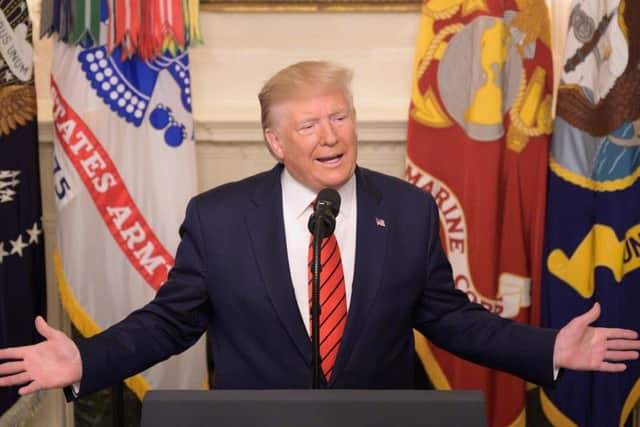Donald Trump launches attack on Nato partners, threatens to drop IS fighters back in UK
The US president hailed the death of Baghdadi, but used his press conference to brand EU nations a “tremendous disappointment” in what he said was their unwillingness to repatriate imprisonsed Isis, or Daesh, fighters.
Mr Trump, who has repeatedly pressed Europe to take back large numbers of prisoners from the camps in Syria, also renewed his threat to release them at the countries’ borders.
Advertisement
Hide AdAdvertisement
Hide AdWhile he thanked Russia, Turkey, Syria and Iraq for assistance in the operation to kill Baghdadi, the president said he had pressured EU countries to take back Isis members. “They came from France, they came from Germany, they came from the UK – they came from a lot of countries,” he said.


“And I actually said to them, if you don’t take them, I’m going to drop them right on your border and you can have fun capturing them
again.”
He also suggested that if detainees escape Kurdish-controlled camps, the US would not “capture people that want to go back to Germany, France, UK and other parts of Europe”.
“They could walk back – they can’t walk to our country,” he said. “We have lots of water in between our country and them.”
Escapes by Isis fighters from the camps have been reported since Mr Trump ordered the US military to withdraw from Syria earlier this month, sparking Turkish airstrikes and a military incursion into the area.
The US president has said he was unconcerned about the potential for escapees because “they’re going to be escaping to Europe”. He added: “That’s where they want to go, they want to go back to their homes. But Europe didn’t want them from us. We could have given it to them, they could have trials, they could have done whatever they wanted.”
In August, he also claimed he would “release [thousands of Isis fighters] to Europe” if they were not repatriated.
Dozens of jihadis from the UK and at least 60 British children who fled as the Isis “caliphate” fell are thought to be held in northern Syria, including Shamima Begum and Jack Letts. British sisters Reema and Zara Iqbal, who married Isis fighters after travelling to Syria in 2013, are also believed to be held in the camps.
Advertisement
Hide AdAdvertisement
Hide AdIn the last audio message released before his death, Baghdadi directly called for his followers to free detained Isis members and their families from camps.
The UK Government has repeatedly refused to repatriate Isis prisoners for trial and has increased its use of controversial citizenship deprivation powers to prevent any return to the UK.
However, reports have suggested it may be preparing to transfer children of British jihadis, although it is not known if the policy would only apply to unaccompanied children and orphans.
Several MPs have called for the government to repatriate UK extremists, which Kurdish officials called Britain’s “moral and legal duty”.
While there was no response from the UK government to Mr Trump’s threat, Boris Johnson called Baghdadi’s death “an important moment in our fight against terror”, but added: “The battle against the evil of Daesh is not yet over.
“We will work with our coalition partners to bring an end to the murderous, barbaric activities of Daesh once and for all.”
Defence secretary Ben Wallace also said the “world will not miss” Baghdadi, who died after running into a dead-end tunnel and ignited an explosive vest, killing himself and three of his young children after being surrounded by specialist forces.
Mr Wallace said he welcomed the US action. He said: “Isis is one of the most murderous terrorist organisations of our generation. Their leaders have twisted Islam to groom thousands of people into joining their evil cause. I welcome the action that has been taken. The world will not miss al-Baghdadi.”
Advertisement
Hide AdAdvertisement
Hide AdForeign secretary Dominic Raab said it was important not to “allow Daesh to glorify” its dead leader, adding: ““The death of Baghdadi is a significant milestone in the coalition’s work to defeat Daesh, but it is not the end of the threat. Daesh has imposed terrible suffering on innocent civilians. The UK will continue to work with our international partners to bring this to an end.”
The SNP’s Westminster defence spokesperson Stewart McDonald said: “The removal of Baghdadi will undoubtedly serve as a blow to Daesh. However, the poisonous ideology remains and we must work effectively with our international allies and partners in rooting it out.
“The UK Government must step up efforts with our European neighbours to bring perpetrators to justice.”
Mr Trump watched the raid on al-Baghdadi’s home from the White House. He said viewing it was “as though you were watching a movie”, claiming the IS leader had been under surveillance for several weeks.
He said that during the raid, US forces “flew low and fast and were met with gunfire at points”. No American personnel were lost in the encounter, he said.
Baghdadi became the leader of al-Qaeda in Iraq in 2010 – a year before the death of Osama bin Laden – and waged a terrorist campaign in the country before expanding into Syria and declaring the formation of Isis in 2014.
